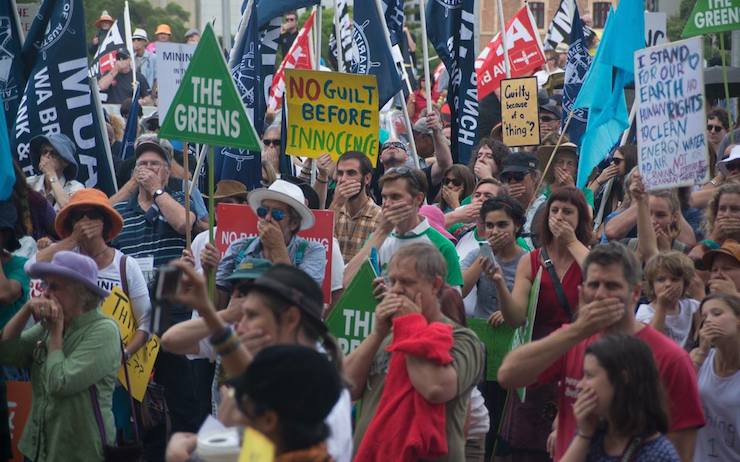The Federal Senate has passed a motion calling on the West Australian government to abandon “divisive and unnecessary” anti-protest laws which have been strongly condemned by the United Nations.
The motion, introduced by Greens Senator Rachel Siewert and passed on the voices, adds to a long list of institutions and individuals who are concerned about what Colin Barnett’s government is proposing.
Last week three separate United Nations Special Rapporteurs issued a joint statement condemning the anti-protest laws, saying it would have the “chilling affect of silencing dissenters”.
“It would go against Australia’s international obligations under international human rights law, including the rights to freedom of opinion and expression as well as peaceful assembly and association,” the three Special Rapporteurs said.
Hundreds of people protested against the bill at the West Australian Parliament yesterday, and a coalition of more than 80 community organisations, legal centres, and unions have signed an open letter opposing the bill.

The Federal Senate this afternoon noted “the important role public protest and free speech have played, and continue to play in a healthy democratic society”. However that role may be dramatically curtailed by the time West Australia’s Parliament adjourns tonight.
The bill is being progressed in the lower house of the state Parliament this afternoon, having moved through the upper house last week.
The legislation will inevitably pass, because the Barnett Government controls both houses, but it faced nearly a year of staunch opposition from Labor and the Greens.
The anti-protest law creates two new criminal offences. Under the first, it will become illegal to physically and intentionally prevent a lawful activity being carried out. And under the second, it will become illegal to possess with the intent of using, or to use a “thing” to prevent a lawful activity.
On top of this extremely broad drafting, there is concern that the onus of proof is reversed for both new offences. The President of the West Australian Law Society, Mathew Keogh has previously said that the bill “may erode fundamental aspects of our criminal justice system”.
“The legislation is so broad that it is almost impossible to say how they may be applied down the track,” he said.
I’m pretty sure @ColinBarnett new law is about to make rugby illegal in WA #protectprotestWA #auspol pic.twitter.com/MbJwQF3cOI
— Graham K. Brown (@GrahamKBrown) February 22, 2016
Those who fall foul of the anti-protest bill would face penalties of 12 months in prison, or a $12,000 fine. In ‘aggravating circumstances’ those penalties would be doubled to two years or $24,000.
There are also provisions in the legislation that could see courts order protestors to pay the “reasonable expenses” developers or police incur when removing a physical barrier used in a protest.
The West Australian government has argued that the laws are necessary because protestors are using increasingly innovative means to hampered plans like the development of a gas hub at James Price Point.
In those demonstrations, and others against logging in the state’s south-west, creative new devices have been used by protestors to lock themselves to machinery or create another barrier to development work.
Senator Siewart takes a different view, arguing “were it not for peaceful protest, awful projects such as James Price Point would have gone ahead”.
“The anti-protest laws that Colin Barnett is pushing through State Parliament attacks free speech, public protest and a healthy democratic society,” Siewart said.
“I urge Colin Barnett to consider the calls of the Senate, as well as the United Nations, and abandon these divisive and unnecessary laws,” she said.
Donate To New Matilda
New Matilda is a small, independent media outlet. We survive through reader contributions, and never losing a lawsuit. If you got something from this article, giving something back helps us to continue speaking truth to power. Every little bit counts.





